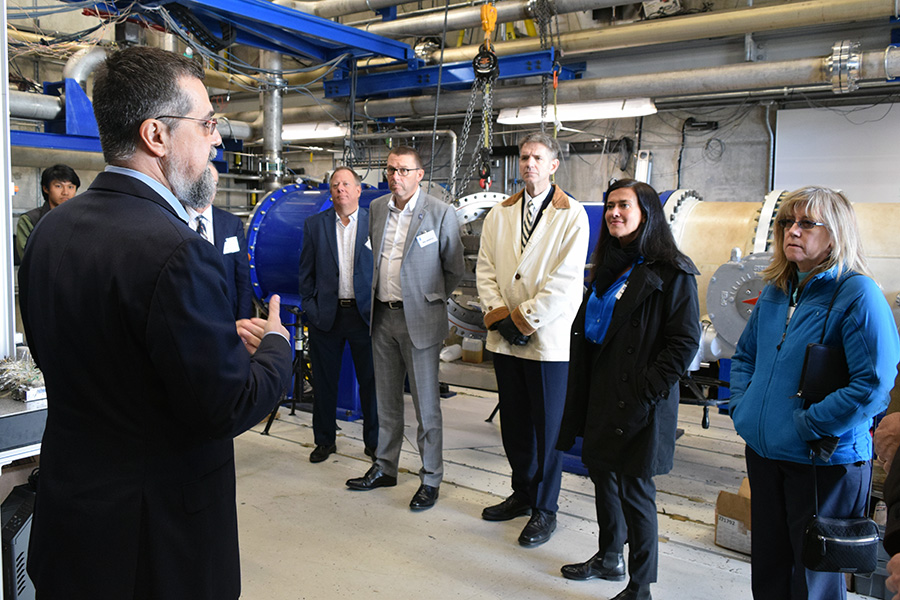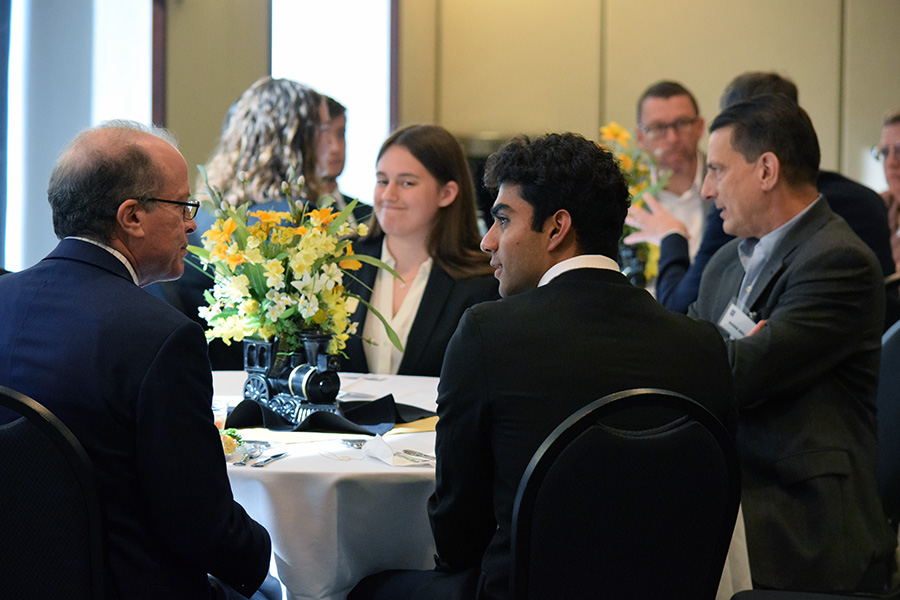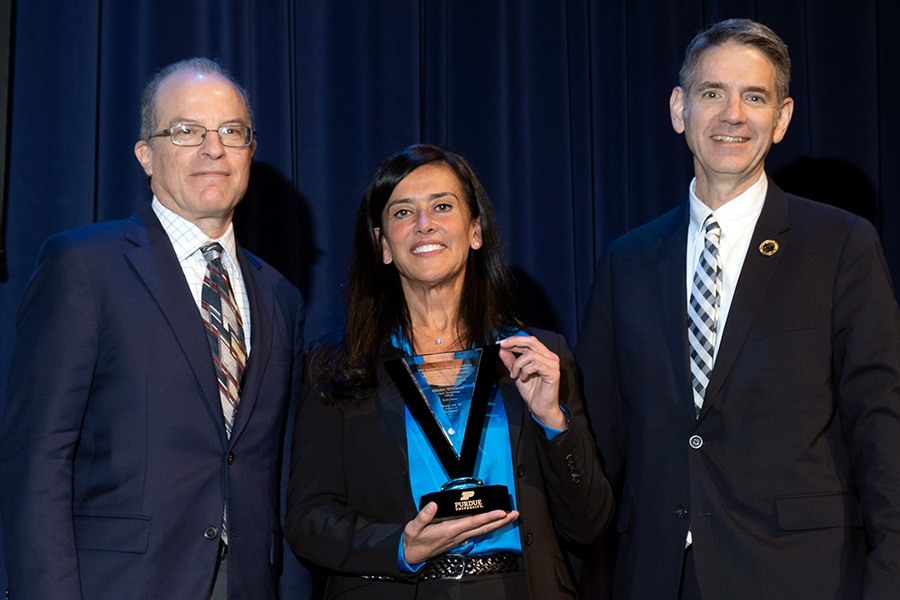Rolls-Royce CTO speaks on sustainability in aviation for 2022 Boeing Distinguished Lecture
| Author: | Alan Cesar |
|---|
Achieving sustainable aviation is not only an enormous challenge, it is one that the industry must tackle head-on, says Rolls-Royce Chief Technology Officer Grazia Vittadini. As this year’s guest for the William E. Boeing Distinguished Lecture Series, she spoke at Purdue about the paths her company is pursuing to achieve zero-emission commercial flight.
The Boeing lecture series, which began in 1999 and is administered by the School of Aeronautics and Astronautics, invites an internationally known person from the aerospace or air transportation industry to speak to students and faculty at Purdue. This is the first Boeing lecture since the COVID-19 pandemic began.
Todd Citron, Chief Technology Officer of Boeing, introduced Grazia as not only a leader in aerospace, but also an “innovative, forward-looking thinker in artificial intelligence and quantum computing. On a personal level, she’s a person of great intellect, tremendous energy and warmth.”
Vittadini and Citron, along with several accompanying dignitaries from each of their companies, also toured Purdue labs and facilities and held meetings with Purdue faculty during their visit. Students in the AAE Ambassadors program had the opportunity to meet and network with these representatives over lunch.

Developing sustainable solutions
Vittadini said aircraft and engine manufacturers are continuing to look for ways to operate more sustainably, especially as demand for air travel shows a strong resurgence since the COVID-19 pandemic.
She explained that the nearly complete halt of air passenger traffic in 2020 marked an 8 percent reduction in carbon dioxide emissions – but to meet the goals of the Paris Climate Accord, CO2 emissions need to drop by 8 percent every year. She said that the growing global middle class wants to travel by air, but meeting that demand runs headlong into the need to preserve the natural beauty that they’re traveling to see.
“Aviation plays an ever-important role connecting economies, cultures, and people all around the world,” she said. “If we want to continue enjoying travel and protect our planet at the same time, we need sustainable propulsion.”
She added that sustainability is also a business imperative because of the demands of countries in those climate pacts. “Our future competitiveness depends on our ability to deliver on sustainability,” she said.
“If we do not, we risk losing access to certain markets that have committed to reducing carbon emissions. About one third of our revenues come from travel in Europe, and the UK and Europe have committed to be climate-neutral by 2030. Another third comes from business in the U.S., which has rejoined the Paris Climate Accord.”

No Single Answer
Vittadini covered three categories of solutions for meeting these emissions goals: Improving efficiency, increasing use of sustainable aviation fuels, and exploring next-generation technologies. She said no single entity can create the solutions to meet those goals – it requires international collaboration across industries, companies, and governments.
She pointed to incremental improvements in turbine technology can continue to drive up efficiency; optimizing routes can also reduce emissions by up to 10 percent.
Sustainable aviation fuels (SAF) have the potential to reduce engine emissions by up to 80 percent, but it must be made in a way that doesn’t take over agricultural farmland, or generate carbon through its manufacture, she said. Synthetic fuels, however, are very energy-intensive to produce. Vittadini said Rolls-Royce is making a demonstrator carbon-capture system, and working on small, modular nuclear power stations that could power that system as well as a manufacturing facility for synthetic SAF.
Vittadini also talked about their collaborative work on prop-driven electric commuter aircraft, and their development of a hydrogen-burning turbine engine. The latter faces significant challenges to storing the low-density gas on an airplane, and the need to generate large amounts of hydrogen as a fuel – problems that Rolls-Royce can’t tackle alone.

“The levers of change cannot be operated by just one player. This will require the collaboration of all sectors involved,” she said. “Students, this is where you come into play. You are the pioneers of tomorrow who will be called upon to continue trailblazing and leading this transition.”
She drew on the innovative approach of of aviation leaders like Amelia Earhart – who has a significant legacy at Purdue – and William Boeing, saying that channeling their drive is necessary to make aviation sustainable.
“[Earhart] is an icon of courage, determination, and perseverance. She embodies that pioneering spirit, and can-do attitude that we need in the aerospace sector,” said Vittadini, who was personally inspired by Earhart to pursue her love of aerospace. “That is what we require today to continue pushing the boundaries of aerospace technology.”
“Let’s take that seat, front left, and pilot change together.”
About Grazia Vittadini
Grazia Vittadini joined Rolls-Royce as CTO in November 2021 after a two-decade career at Airbus. She was the first woman on the Airbus Executive Committee when she was appointed Airbus’ CTO. She holds a degree in aeronautical engineering from Politecnico di Milano, and is also a licensed pilot.
